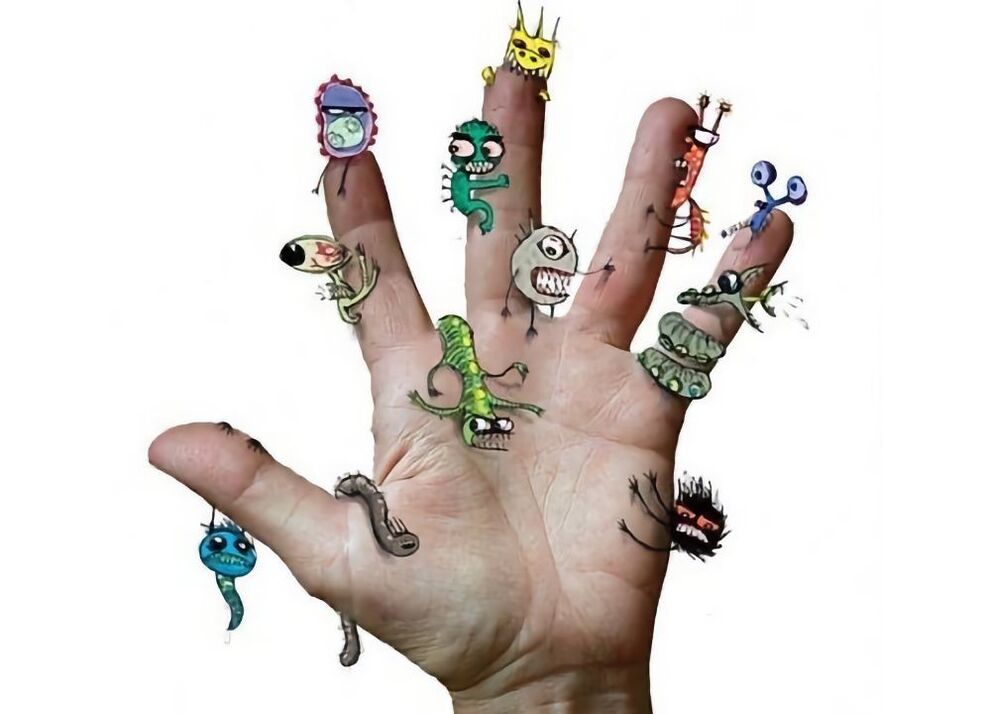
According to WHO data, every second person on the planet is infected with helminths every year. Many people think that parasitic worms do not cause much harm to health. However, everything is not so simple: helminths can affect important internal organs: heart, lungs and brain.
Helminths - who are they?
Helminths are parasitic worms that can choose a human, animal or plant organism as a host. In general, there are three classes of helminths:
- Tapeworms. This class includes about 3. 5 thousand species of helminths. The length of parasitic worms ranges from a few mm to 10-15 meters;
- fluxes.Parasites are so called because they have suckers that they use to get food. The human body can be infected with about 4 dozen types of goiter. As a rule, the length of worms does not exceed 5 cm;
- round worms.This class of helminths has more than 24 thousand species. Roundworms are rod-shaped. As a rule, their length does not exceed 0. 5 meters.
You can get infected with helminths in different ways. However, most often the invasion of parasites occurs due to the following reasons:
- Poor hand hygiene.
- unwashed vegetables, fruits; Undercooked or undercooked meat, fish - the use of such products increases the risk of parasite invasion many times.
- Store food outside the refrigerator. Insects can transfer helminth eggs to products that are stored without packaging.
- Contact with domestic animals.
The main symptoms of the presence of parasites in the body are:
- nausea, vomiting, diarrhea;
- weight loss;
- allergic rash;
- bloating;
- itching in the anus;
- Brushing teeth in a dream.
Learn more about the signs of parasites in the bodyRead our article.
What helminths are found most often in our country? Consider the most common types of parasitic worms and the diseases they cause.
Tapeworms
The body of a tapeworm consists of segments, the total number of which varies from 3 to 5000. The main element of helminth fixation is the head, additional - suction cups, hooks.
The most common causes of tapeworms are:
Diphyllobothriasis
The causative agent of the disease is a broad tapeworm that affects the human intestines.Worm eggs develop in fresh water. The scheme of getting a tapeworm into the human body is as follows:
- Worm eggs are swallowed by crustaceans living in the reservoir.
- Infected crustaceans are eaten by fish.
- Humans become infected with the parasite by eating fish that has undergone insufficient heat treatment.
Symptoms of the disease develop 1. 5 months after infection. The main sign of pathology is the presence of whitish fragments of helminths in feces.
By adhering to the intestinal mucosa, the tape absorbs large amounts of vitamin B12. For this reason, people with diphyllobothriasis often develop anemia. In addition, tapeworms can cause increased obstruction of the liver, spleen, and intestines.
Thenarynhosis
The causative agent of the disease is bovine tapeworm, which lives mainly in the small intestine of humans. During the development cycle, the helminth changes two owners: the intermediate one is cattle, and the main one is man. Bull tapeworm lives in the body for 20 years, reproduces and harms health. The disease is common in many regions, but it is most common in places where it is cold.
People usually get taeniarhynchosis after eating undercooked or undercooked beef.
The disease often proceeds without pronounced symptoms and is revealed by chance when a person sees helminthic elements in the feces. In some people, in addition to the main signs of infection with helminths, pain may occur on the right side of the anterior abdominal wall.
Adult helminths can enter the appendix, pancreatic duct, bile ducts, which provokes acute inflammatory processes in them. Intestinal obstruction may develop during multiple infestations of parasites.
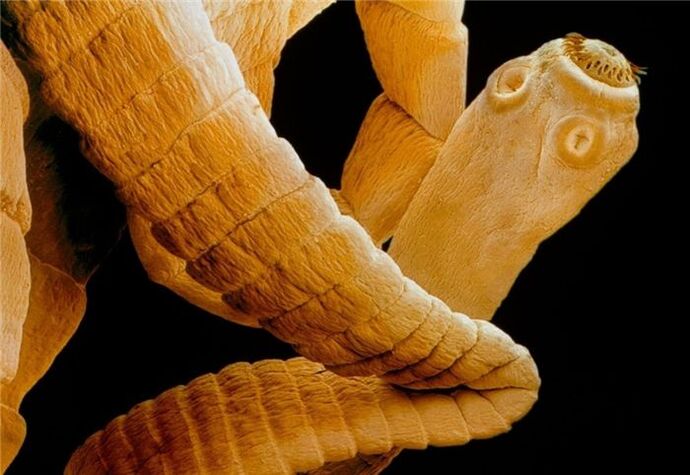
Taenia
The causative agent of the disease is pork tapeworm, which initially infects the human small intestine.Human infection occurs through consumption of raw or undercooked pork.
The parasite can penetrate various organs and tissues and cause pain in the abdomen, back and limbs. The most favorable pathology occurs when the worm is localized in subcutaneous fat and skeletal muscle tissue. Entering the eye muscles, helminths cause a decrease in visual acuity, lacrimation and photophobia. Defeat of the brain pork tapeworm can be fatal.
fluxes
Flakes have a leaf-like shape and are characterized by a high ability to reproduce in different periods of the life cycle. Worms can reproduce not only with sexual fertilization, but also without it. In addition to worms, worms have many hooks and spines, due to which they are securely attached to the mucous membranes of organs.
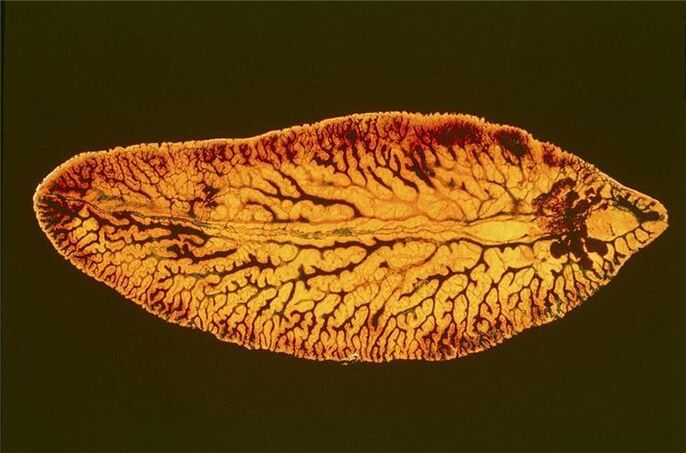
Common pathologies caused by foci:
- fasciolosis;
- opisthorchiasis;
- Paragonimiasis.
Fascioliasis
Fascioliasis develops when the liver or gallbladder is damaged.Basically, the infection occurs when eating vegetables that have been irrigated from open reservoirs.
In addition to the standard signs of parasite infection, a person may develop asthma attacks accompanied by shortness of breath, facial flushing, dilated pupils, and tachycardia. If an adult causes obstruction of the biliary tract, then obstructive jaundice develops. Signs of pathology:
- cramping pain in the right hypochondrium;
- yellowing of the skin;
- Fever
- Colorless stools.
Opisthorchiasis
The causative agent of the disease is catnip. The name of the parasite is due to the fact that, in addition to humans, it often infects cats and other mammals that eat fish.
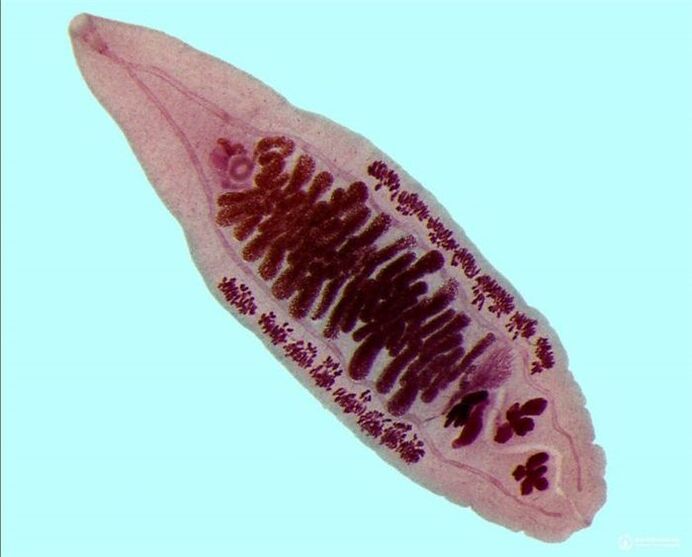
As a rule, catnip affects the liver and pancreas, which causes inflammation of the organs. Symptoms vary and depend on the number of parasites. The patient may experience:
- symptoms of intoxication;
- fever,
- urticaria;
- itchy skin;
- Pain in muscles, joints, right hypochondrium.
In some cases, helminths cause the growth of lymph nodes, the development of jaundice. The chronic form of the pathology often causes hepatitis, cirrhosis of the liver.
Paragonimiasis
The culprit of the disease is lung goiter, which enters the human body together with infected crustaceans.
First, the parasite enters the human intestine, then the abdominal cavity. The end point of its journey is lung tissue. In addition, the worm can penetrate the brain and affect the central nervous system.
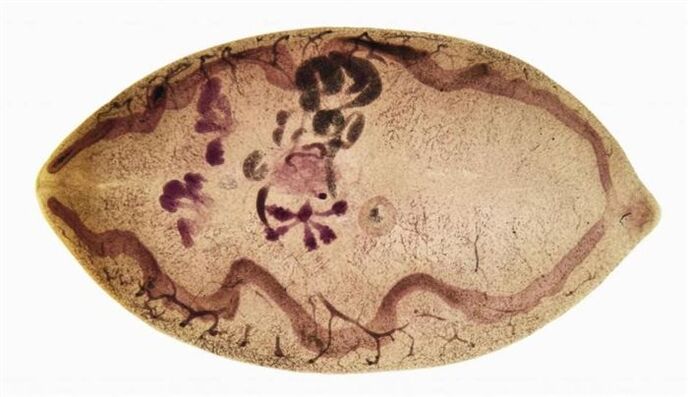
Specific signs of parasitic invasion of the lungs:
- pain syndrome in the chest area;
- Cough with sputum that may contain pus and blood;
- Fever.
In some cases, helminths cause a violation of the ventilation function of the lungs and gas exchange during breathing.
round worms
Due to their structure, roundworms (nematodes) can survive even in extreme conditions.Their body is covered with a three-layer skin-muscle bag, which reliably protects parasites from external influences.
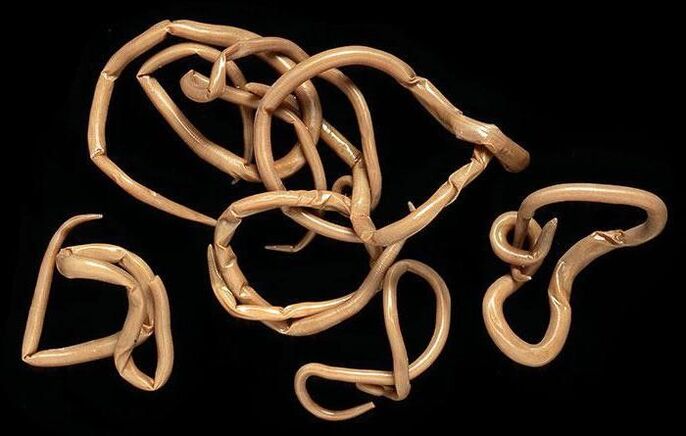
Common diseases caused by nematodes:
- ascariasis;
- enterobiosis;
- Trichinosis.
Ascaridosis
The development of the disease causes a roundworm, which is initially fixed in the small intestine. The average length of adults is 40 cm.Parasite larvae can enter the human digestive system through unwashed vegetables and fruits, contaminated water.Also, often the cause of ascariasis is poorly washed hands before eating.
When larvae enter the body, a person may develop subfebrile temperature, allergic rash, cough with clear sputum. Signs of the intestinal stage of ascariasis (diarrhea, abdominal pain) are observed only in the presence of several parasites. As a rule, living in the intestines of one worm is asymptomatic.
Complications with multiple parasite infestations:
- blockage of the bile duct;
- purulent inflammatory processes in the gall bladder, liver;
- inflammation of the appendix;
- Intestinal obstruction.
Enterobiosis
The provocateurs of the disease are pinworms - small worms up to 1 cm long.Helminths enter the human digestive system in the same way as roundworms.
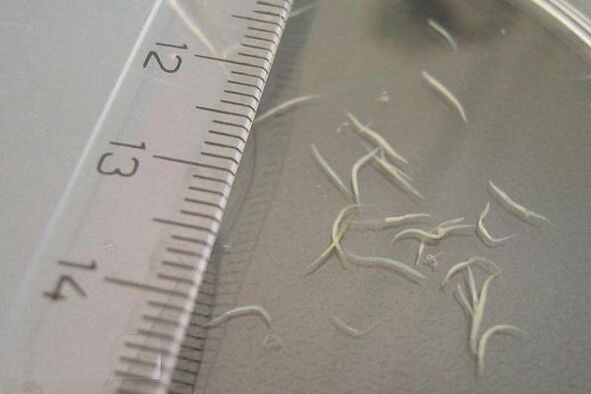
Currently, enterobiasis is the most common parasitic pathology in the world. Mostly, the disease is diagnosed in children under 10 years of age.
Symptoms, as in the previous cases, develop only with the invasion of numerous parasites. Children often have diarrhea, mucus in the stool, difficult and painful digestion, itching in the anus and nausea. In severe cases of the disease, leg cramps may occur. In addition, worms can penetrate into the genitals, which causes acute inflammation in them.
Trichinosis
This disease is provoked by trichinella - one of the smallest parasitic worms. The length of the parasite rarely exceeds 4 mm. In the larval stage, worms can infect skeletal muscles. The exception is the myocardium - the muscle tissue of the heart. Adults parasitize in the small intestine.
As a rule, human infection occurs when eating half-baked pork.In addition, it is enough to consume only 30 grams of meat infected with parasites for the development of the disease.
Pathology is manifested by standard symptoms of parasite invasion. In the advanced stage, swelling of the eyelids, face, hands and feet, pain in the lower back, chewing muscles may occur. Possible complications are complete or partial loss of mobility, paralysis of the respiratory tract.
How to prevent infection with helminths?
To reduce the risk of infection with parasitic worms, it is important to observe the following rules:
18 signs of the presence of parasites in the body
While in the human body, the parasite has a serious, pathogenic effect. At the same time, the same parasite can produce multiple mechanisms of action on humans at the same time.
WHO believes that at the moment, about four and a half billion people in the world constantly suffer from various parasites.
This problem is very relevant, because it is very difficult to diagnose parasitosis. Worm infestations (a large collection of parasitic diseases) can occur in humans even after the parasite has disappeared. And if the patient noticed this, then in this case he will certainly come to the medical institution. Parasitosis can be detected during preventive screening. But unfortunately, these cases are a drop in the ocean.
Mechanisms of action:
mechanical impact.For example, if a roundworm is in the intestines, it will certainly press on and damage the intestinal wall. In some cases, it causes an inflammatory process. If, for example, echinococcus is located in the liver, lungs or kidneys, the tissue will shrink accordingly. This is a classic, mechanical effect: explosion, pressure, dysfunction of the organ or system in which the parasite is present. There are many not only luminal parasites that are found in the gastrointestinal tract, but also many tissue parasites that can fully realize E. yearmechanical action.
stimulation of allergic reactions.Unfortunately, when a person has allergic reactions, he starts going in circles: to a dermatologist, a pediatrician, a general practitioner, an allergist, but doctors do not always rule out the presence of parasites in the body. first place
Any parasite, even a banal pinworm, can cause serious allergic reactions, and they can be diverse, both on the skin and affecting the bronchopulmonary tree. For example, frequent obstructive bronchitis in children may be caused by a parasite living in the intestines.
Effect on microflora.It is no secret that man is a globe for the vast world of microbiota. The microflora that lives on all our mucous membranes, skin, organs, tissues is the friendly microflora that produces vitamins, minerals, hormones, enzymes and helps our body to live normally. And now, unfortunately, in the presence of parasites, it begins to actively die.
immunosuppressive action.Today it is clearly proven that the waste products of parasites severely suppress the immune system. They just block. Moreover, parasites have learned over millions of years to mimic and hide from the immune system by producing special anti-enzymes. In this way, the immune system is blocked, and sometimes a person can suffer from various parasites for decades. Which sooner or later causes serious diseases in the body as a whole, or in a separate organ or system.
Action of antienzymes. Unfortunately, parasites can not only spoil our body. If we try to eat vitamin food, mineralized, drink a complex of vitamins and minerals, they will not always benefit us, because the lion's share will be taken by our free buyers.
Mechanism of nervous reflex action.The waste products of the parasites poison the nervous system. And very often this can affect the psycho-emotional state of both an adult and a child. Any psychosomatic illness can be associated with parasitic invasion. The child may be hyperreactive, or on the contrary, lethargic, tearful, prone to depression - all this may be the result of the presence of a parasite in the body. For example, even the simplest Giardia produces toxins. Give them in microdoses, but they are still toxins, identical to psychotropic substances. Of course, a child or an adult with such permanent poisoning experiences a serious load on the functioning of the central nervous system. And all kinds of psychological and mental disorders can follow from this: sleep disorders, nervous disorders, various psychological problems. Moreover, neither the parents nor the patient himself, if he is an adult, can even think that it is caused by the invasion of parasites.
In my opinion, the most serious and terrible neoplasms are stimulated by parasites. Long-term presence of parasitism in the body can provoke such a problem as the formation of neoplasms: benign and malignant. Moreover, stimulation of neoplasms can be related to two factors.
The first factor is the direct, harmful action of tissues of a particular organ.
The second factor is the action mediated by the sharp suppression of the immune system. The point is that the part of the immune system that is responsible for anti-parasitic defense is also responsible for anti-tumor defense. As a result of improper division, a cancer cell can appear in the human body. In this case, the deficiency of the immune system will be manifested in such a way that this cell will not be recognized by our immune cells in time and will not die in time.
When can a person suspect the presence of parasites?
Now I will tell you a list of clinical manifestations of parasitic infestations, in the presence of which you should immediately consult a doctor to find out if you really have this diagnosis.
- The most common clinical symptom is itching in the anus. Many people understand this, so it is related to the presence of parasites, especially in children's practice.
- Brushing teeth in a dream. Again, very often this can be the case in pediatric practice. Mothers suddenly noticed that the child started grinding his teeth in his sleep. Why is this happening? Very often, crunches in children are associated with terrible dreams. This is the mechanism of the toxic effect on the central nervous system that we talked about. The child sees a terrible dream and grinds his teeth in fear in his sleep. This is one of the reasons. There are other reasons. The formation of trismus or an increase in the tone of the masticatory muscles can also be a symptom in this case.
- Salivation during sleep, salivation in the morning, nausea when brushing the teeth in the morning. These are all manifestations that may indirectly indicate the presence of parasites in the body.
- Peeling of fingers and toes, peeling of the skin in layers.
- Increased feeling of hunger, sometimes to fatigue.
- Allergic rash on the skin. When giving doctor's lectures, I very often pay attention to the fact that doctors are not in a hurry to give anti-allergic drugs to this or that patient. Find out to the end - whether there are helminthic invasions. Because a high degree of allergy, which suddenly appears in a person in a short time, may indicate, first of all, that the patient has a parasitic invasion.
- Rashes in the eyelids, their peeling, swelling. Mental disorders without known causes.
- Any itching of the skin. Especially in children's practice. First of all, it is necessary to exclude the presence of parasite invasions.
- Suffering from such symptoms as bloating, itching in the abdomen, unstable stools. Any problems with the gastrointestinal tract.
- There is a lack of body weight, or on the contrary, excess weight. In case of parasitosis, it can be both.
- The presence of several chronic diseases at the same time. Diseases of joints, bronchopulmonary tree, gastrointestinal tract. If suddenly a person begins to get sick in stages, then one, then the second, then the third, then the fifth, then the tenth, and at first there were no obvious reasons for this, then this is an occasion to think about presence. parasites in the body.
- Poor health and the diagnosis is unclear. Such patients can go to different specialists and try one or another examination. Finally, the diagnosis will remain unclear and the health status will remain poor.
- Unexplained pains in the abdomen, volatile, sudden spasms, drawing pains. It is also necessary, especially in pediatric practice, to exclude the presence of parasites.
- Prolonged toxic-allergic manifestations. Suddenly, incomprehensible allergic reactions to food appear periodically.
- Persistent anemia. When hemoglobin is significantly reduced and difficult to correct. It is worth thinking, first of all, about the presence of parasites in the human body.
- In children: delay in physical, psychosomatic, psychoemotional development, hyperreactivity or vice versa, lethargy, in schoolchildren, poor absorption of material - all this may indicate the presence of hidden parasitosis in the body.
- Prolonged lymphadenopathy (a condition characterized by enlarged lymph nodes), recurrent lymphadenitis may also indicate the presence of parasitic infestations.
I listed the main clinical signs of parasitosis. Notice how wide they are. And with these symptoms, the patient can refer to almost any doctor. It is believed that if a person has found two or three such signs in himself, then he is already subject to a more thorough examination for the presence of parasitism, or the presence of an anti-parasitic program.
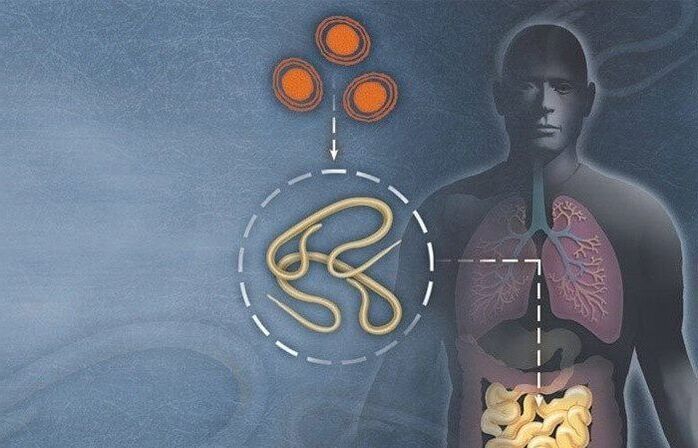
During the consultation, you will be able to voice your problem, the doctor will explain the situation, decipher the analyses, answer your questions and give you the necessary recommendations.
I want to draw the attention of people who want to treat themselves. If you go to the pharmacy and ask the pharmacist: "Give me something for worms", then you are making a grave mistake - it cannot be done. First, the pharmacist is not responsible for how you take this drug. Second, he is not responsible for the results. Third, you can veryHarm yourself. Don't do it. To find out if you have a parasitic infection, it is very important to contact a specialist, go through a certain list of tests and only then take an adequate course of treatment.
What tests show the presence of parasites in the human body?
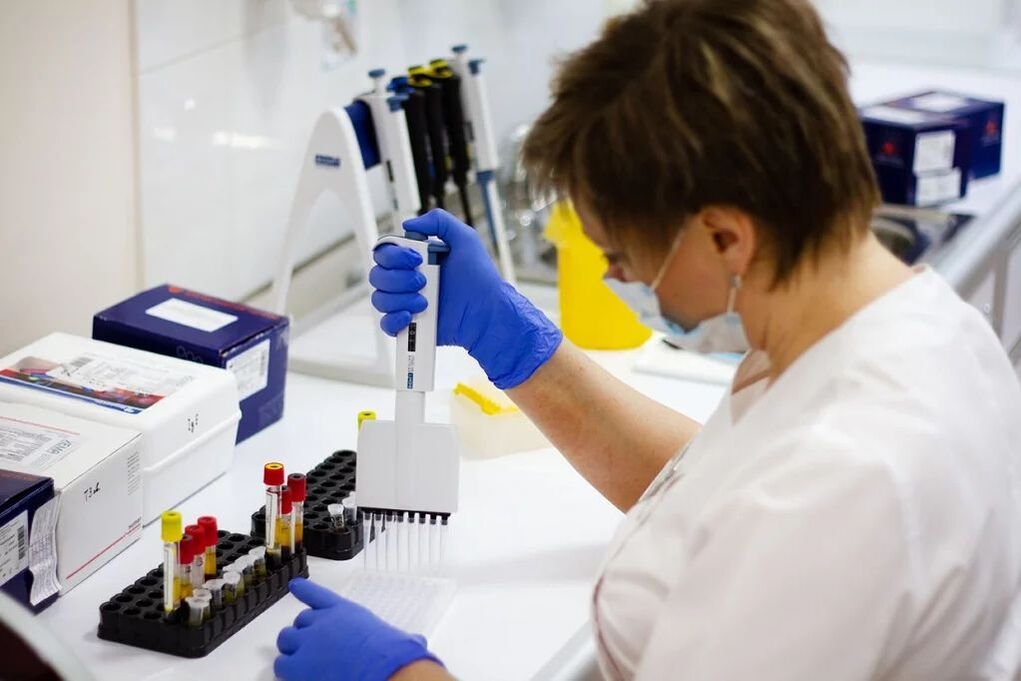
According to WHO statistics, about 4. 5 billion people in the world are constantly infected with parasites. This situation is complicated by the fact that the diagnosis of parasitic infestations is very difficult. How to find out if there are parasites in the body? What laboratory and instrumental research methods can detect parasitism? Let us consider these questions in detail.
Complications
Helminthiasis caused by common types of parasites can be treated with medications prescribed by a doctor. But if you do not pay attention to alarming symptoms, health deterioration, weakness, causeless fatigue, decreased immunity, the disease can cause serious complications.
If the parasites get into the lungs and the patient does not go to the doctor complaining of coughing, shortness of breath, chest pain, shortness of breath, pneumonia or even bronchial asthma may develop.
Parasites in the digestive system can cause cirrhosis, liver abscess, hepatitis, colon cancer, gastrointestinal bleeding, accumulation of fluid in the abdominal cavity (ascites), and peritonitis. They also often provoke chronic kidney disease, meningoencephalitis, loss of vision. Some cestodes (tapeworms) grow over 1 meter long, and small roundworms can form dense balls. This disrupts the normal functioning of the body, causes severe intoxication, pronounced allergic reactions. Death is possible without emergency medical care.
Prevention
Helminthosis often occurs when hygiene rules are not followed or food is not properly processed. To prevent helminthic invasion, you need:
- Do not wear other people's underwear, do not share towels with strangers.
- Wash your hands well before eating - it is important to do this not only before breakfast, lunch, dinner, but also before eating.
- Wash your hands after using the toilet.
- Wash your hands thoroughly after working on the beds and do all gardening with thick rubber gloves.
- Use only clean water for drinking and cooking.
- Wash fruits and vegetables well under running water.
- Eat meat, fish, seafood that has undergone heat treatment.
- Do not buy products on spontaneous markets, from persons who cannot confirm the safety of the goods.
- Monitor the health of pets, regularly complain, even if the pet lives in an apartment and does not go outside. To select drugs and calculate the dosage, contact your veterinarian.
- Maintain cleanliness in living and working areas. Sometimes people bring helminth eggs on the soles of their shoes. To reduce the risk of infection, it is necessary to carry out regular wet cleaning, disinfect all surfaces.
Even following these rules, the risk of infection cannot be completely eliminated. To prevent the development of the disease, consult a therapist. The doctor will prescribe drugs for the prevention of helminthiasis. Be sure to let us know how often you travel, whether there are pets at home, a private plot. Drug prevention of helminthiasis is recommended twice a year.

















































